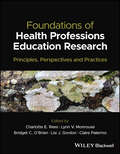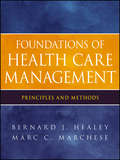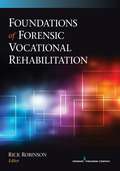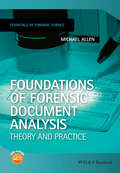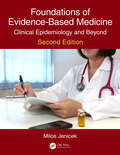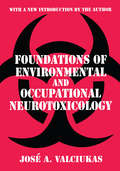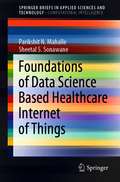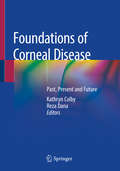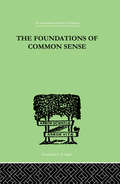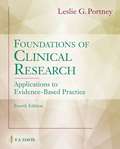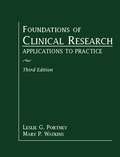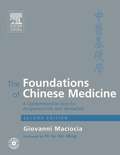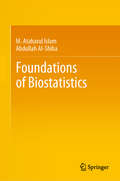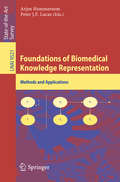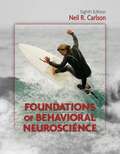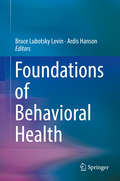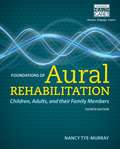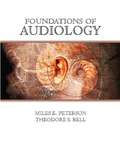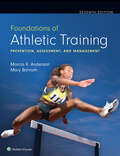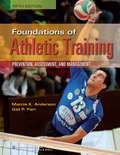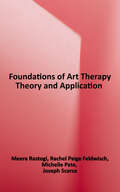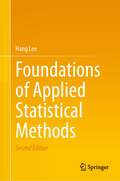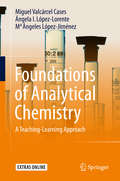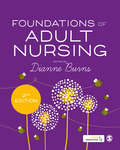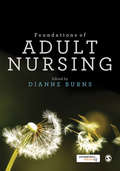- Table View
- List View
Foundations of Health Professions Education Research: Principles, Perspectives and Practices
by Charlotte E. Rees Lynn V. Monrouxe Bridget C. O’Brien Lisi J. Gordon Claire PalermoFoundations of Health Professions Education Research Understand the principles, perspectives, and practices for researching health professions education with this accessible introduction Educating healthcare students and professionals is critical to the long-term improvement of human health. Health professions education research (HPER) is a growing field with enormous potential to enrich the education of medical, nursing, and allied health students and professionals. There is still, however, an urgent need for a textbook focusing on the foundations of HPER that will help new and existing HPE researchers ground their work in research philosophies, evidence-based methodologies, and proven best practices. Foundations of Health Professions Education Research meets this need with a broad-based and accessible introduction to the foundations of HPER. Rooted in the latest theoretical and methodological advances, this book takes a global and interdisciplinary approach, designed to provide the widest possible range of backgrounds with a working knowledge of HPER. It promises to become an indispensable contribution to this growing field of increasingly rigorous research. Foundations of Health Professions Education Research readers will also find: An authorial team with decades of combined HPER experience on multiple continents Educational features such as learning outcomes, illustrative case studies, discussion points, and exercises to facilitate understanding and retention Detailed discussion of different approaches to HPER including scientific, realist, interpretivist, critical, and pragmatic approaches alongside a range of topics taking you through your entire research journey Foundations of Health Professions Education Research is a useful reference for both new and experienced HPE researchers, including postgraduate students studying HPER.
Foundations of Health Care Management
by Bernard J. Healey Marc C. MarcheseFoundations of Health Care Management Leaders and managers throughout the health care system are facing ever more challenging changes in the way care is delivered, paid for, and evaluated. Foundations of Health Care Management: Principles and Methods offers an innovative, concise, reader-friendly introduction to health care management and administration. It addresses the need for new skills in managers of health care facilities and for those planning to enter health care management positions. The book covers such critical topics as leadership training, change management, conflict management techniques, culture building, quality improvement, and communications skills, as well as collaboration in the improvement of population health. Foundations of Health Care Management also concentrates on innovations and describes steps in the transition to more decentralized and creative approaches to the management of health care facilities. The book covers physician management from the physician's viewpoint, a valuable perspective for health care managers. The book serves important dual purposes for faculty and students by providing both insights into the health care field as well as foundational content on essential management and leadership competencies. A full set of support materials is available for instructors at the book's companion Web site.
The Foundations Of Forensic Vocational Rehabilitation
by Rick RobinsonThis is the first fundamental text to focus specifically on forensic vocational rehabilitation, a field that is forecast to grow rapidly. Forensic vocational rehabilitation consultants evaluate the vocational and rehabilitation needs of individuals in an array of legal settings such as civil litigation, workersí compensation, Social Security disability, and others. The text is unique in its exploration of the vocational rehabilitation process from a biopsychosocial perspective that views disability as a complex and multidimensional construct. The book comprehensively describes the parameters and theoretical issues of relevance in evaluating and developing opinions in forensically oriented matters. It culls and synthesizes current peer-reviewed literature and research on this private subspecialty practice area of rehabilitation counseling, including theories, models, methods, procedures, and fundamental tenets of the field. Also included is current information about the labor market, life care planning, and professional identity, standards, and ethics.
Foundations of Forensic Document Analysis: Theory and Practice (Essentials of Forensic Science)
by Michael J. AllenForensic document examination is a long established specialty and its practitioners have regularly been shown to have acquired skills that enable them to assist the judicial process. This book, aimed primarily at students studying forensic science and document examination in particular, introduces all of the essential ideas that are to be found in the work of the forensic document examiner in a concise and straightforward way. Each examination type is described not only in terms of its procedural basis but also the science and reasoning that underpins it. The reader will be able to relate the different kinds of interpretation skills used by the document examiner to those used in other forensic disciplines. This book will be an invaluable text for all students taking courses in Forensic Science or related subjects. The book will also be a useful reference for researchers new to this field or practitioners looking for an accessible overview.The author will be adding new references that are relevant as they are published and some more worked examples from time to time. Please visit qdbook.blogspot.co.uk for more details.
Foundations of Evidence-Based Medicine: Clinical Epidemiology and Beyond, Second Edition
by Milos JenicekThis comprehensive text focuses on reasoning, critical thinking and pragmatic decision making in medicine. Based on the author’s extensive experience and filled with definitions, formulae, flowcharts and checklists, this fully revised second edition continues to provide invaluable guidance to the crucial role that clinical epidemiology plays in the expanding field of evidence-based medicine. Key Features: • Considers evidence-based medicine as a universal initiative common to all health sciences and professions, and all specialties within those disciplines • Demonstrates how effective practice is reliant on proper foundations, such as clinical and fundamental epidemiology, and biostatistics • Introduces the reader to basic epidemiological methods, meta-analysis and decision analysis • Shows that structured, modern, argumentative reasoning is required to build the best possible evidence and use it in practice and research • Outlines how to make the most appropriate decisions in clinical care, disease prevention and health promotion Presenting a range of topics seldom seen in a single resource, the innovative blend of informal logic and structured evidence-based reasoning makes this book invaluable for anyone seeking broad, in-depth and readable coverage of this complex and sometimes controversial field.
Foundations of Environmental and Occupational Neurotoxicology
by Jose A. ValciukasDr. Jose A. Valciukas, in Foundations of Environmental and Occupational Neurotoxicology, has written a thorough, lively, and educational study on toxic substances and their effects. Written in a manner that is accessible to both professionals and non-professionals, Dr. Valciukas explains how health and human behavior may be adversely affected by neurotoxins. He introduces his study with a history of environmental and occupational neurotoxicology.
Foundations of Data Science Based Healthcare Internet of Things (SpringerBriefs in Applied Sciences and Technology)
by Parikshit N. Mahalle Sheetal S. SonawaneThis book offers a basic understanding of the Internet of Things (IoT), its design issues and challenges for healthcare applications. It also provides details of the challenges of healthcare big data, role of big data in healthcare and techniques, and tools for IoT in healthcare. This book offers a strong foundation to a beginner. All technical details that include healthcare data collection unit, technologies and tools used for the big data analytics implementation are explained in a clear and organized format.
Foundations of Corneal Disease: Past, Present and Future
by Kathryn Colby Reza DanaThe field of cornea has seen tremendous advances over the last 40 years—this uniquely comprehensive book will discuss the history of these advances, current best practices in important diseases of the cornea and ocular surface, and examine future directions in diagnosis and management. Written by leading experts, many of whom trained under Claes Henrik Dohlman, MD, PhD, whose influence and many invaluable contributions have defined and shaped the field of cornea, each chapter will reflect the state of the art in the various aspects of cornea. Foundations of Corneal Disease: Past, Present, and Future contains six different sections, opening with an introduction which delves into the evolution of subspecialty training in cornea, and provides a historical perspective of our understanding of ocular surface disease. Section Two addresses perspectives on important corneal and external diseases including infectious keratitis, dry eye, and herpes simplex. Section Three and Section Four address surgery and surgical alternatives, and frontiers in corneal research. Section Six closes this book with a discussion of special topics: imaging the cornea, corneal blindness, eye banking, and clinical trials in dry eye, and explores future directions in this fast-paced field. Foundations of Corneal Disease: Past, Present, and Future contains is an ideal guide for corneal specialists, ophthalmology residents and fellows planning to enter cornea, corneal scientists, and to those in ophthalmology and visual science interested in a comprehensive resource on cornea and the history of this field.
The Foundations Of Common Sense: A PSYCHOLOGICAL PREFACE TO THE PROBLEMS OF KNOWLEDGE (International Library Of Psychology Ser.)
by Isaacs, NathanFirst Published in 1999. Routledge is an imprint of Taylor & Francis, an informa company.
Foundations Of Clinical Research: Applications To Practice
by Leslie G. PortneyBecome a successful evidence-based practitioner How do you evaluate the evidence? Is the information accurate, relevant and meaningful for clinical decision making? Did the design fit the research questions and was the analysis and interpretation of data appropriate? Here are all the materials you need to take your first steps as evidence-based practitioners…how to use the design, data and analysis of research as the foundation for effective clinical decision making.
Foundations of Clinical Research: Applications to Practice (3rd Edition)
by Leslie G. Portney Mary P. WatkinsBook intended for medical students, residents, fellows and research nurses pursuing clinical research, which covers the basics - logic and thinking , growing emphasis on Evidence Based Practice (EBP), systematic reviews, meta-analysis etc.
The Foundations of Chinese Medicine: A Comprehensive Text for Acupuncturists & Herbalists
by Giovanni Maciocia Su Xin MingThis successful Chinese medicine textbook covers the theory of traditional Chinese medicine and acupuncture, and discusses in detail the use of acupuncture points and the principles of treatment. The material is based on rigorous reference to ancient and modern Chinese texts, and explains the application of theory in a Western practice context. The new edition features new and updated material, including discussion of 50 additional acupuncture points and more patterns. A redesigned layout complements the accessible writing style and makes the material even easier to follow.
Foundations of Biostatistics
by M. Ataharul Islam Abdullah Al-ShihaThis book offers a comprehensive guide to essential techniques and methods in biostatistics, addressing the underlying concepts to aid in comprehension. The use of biostatistics techniques has increased manifold in the recent past, due to their suitability for applications in a wide range of problems in various fields. This book helps learners grasp the materials in detail, equipping them to use biostatistics techniques independently and confidently. The book starts with a summary of background materials, followed by methods and techniques. As such, with only minimum guidance from teachers, this book can provide materials for self-learning of biostatistics techniques with a deeper level of understanding. The first two chapters focus on fundamental concepts, sources of data, data types, organization of data, and descriptive statistics, followed by the basic probability concepts, distributions and sampling distributions needed in order to combine descriptive statistics with inferential techniques. Estimation and tests of hypotheses are illustrated in two separate chapters. Important measures of association, linear regression, analysis of variance and logistic regression, and proportional hazards models are then presented systematically, ensuring that the book covers the topics most essential to students and users of biostatistics in connection with a wide range of applications in various fields. The book has been carefully structured, and the content is presented in a sequence covering the essential background in a highly systematic manner, supporting the learning process by presenting theory and applications that complement one another.
Foundations of Biomedical Knowledge Representation
by Arjen Hommersom Peter J.F. LucasMedicineand health care are currently faced with a significant rise in theircomplexity. This is partly due to the progress made during the past threedecades in the fundamental biological understanding of the causes of health anddisease at the molecular, (sub)cellular, and organ level. Since the end of the1970s, when knowledge representation and reasoning in the biomedical fieldbecame a separate area of research, huge progress has been made in thedevelopment of methods and tools that are finally able to impact on the waymedicine is being practiced. Eventhough there are huge differences in the techniques and methods used bybiomedical researchers, there is now an increasing tendency to share researchresults in terms of formal knowledge representation methods, such asontologies, statistical models, network models, and mathematical models. Asthere is an urgent need for health-care professionals to make better decisions,computer-based support using this knowledge is now becoming increasingly important. It may also be the only way to integrate research results from the differentparts of the spectrum of biomedical and clinical research. Theaim of this book is to shed light on developments in knowledge representationat different levels of biomedical application, ranging from human biology toclinical guidelines, and using different techniques, from probability theoryand differential equations to logic. The book starts with two introductorychapters followed by 18 contributions organized in the following topicalsections: diagnosis of disease; monitoring of health and disease andconformance; assessment of health and personalization; prediction and prognosisof health and disease; treatment of disease; and recommendations.
Foundations of Behavioral Neuroscience (Eighth Edition)
by Neil R. Carlson'Foundations of Behavioral Neuroscience' offers a briefer, sixteen chapter introduction to the foundations of physiology, incorporating the latest studies and research in the rapidly changing fields of neuroscience and physiological psychology.
Foundations of Behavioral Health
by Bruce Lubotsky Levin Ardis HansonThis comprehensive book examines the organization, financing, delivery, and outcomes of behavioral health (i.e., alcohol, drug abuse, and mental health) services from both U.S. and global perspectives. Addressing the need for more integrative and collaborative approaches in public health and behavioral health initiatives, the book covers the fundamental issues in behavioral health, including epidemiology, insurance and financing, health inequities, implementation sciences, lifespan issues, cultural responsiveness, and policy.Featuring insightful research from scholars in an interdisciplinary range of academic and professional fields, chapters fall into three distinct sections:Overview: Outlines the defining characteristics of behavioral health services and identifies significant challenges in the fieldAt-Risk Populations: Explores critical issues for at-risk populations in need of behavioral health services, including children in school environments, youth in juvenile justice systems, and persons with developmental disabilities, among othersServices Delivery: Presents a rationale for greater integration of health and behavioral health services, and contextualizes this explanation within global trends in behavioral health policy, systems, and servicesAn in-depth textbook for graduate students studying public health, behavioral health, social work policy, and medical sociology, as well as a useful reference for behavioral health professionals and policy makers, Foundations of Behavioral Health provides a global perspective for practice and policy in behavioral health. It promotes better understanding of the importance of integrating population health and behavioral health services, with an eye towards improving and sustaining public health and behavioral health from national, regional, and global perspectives.
Foundations of Aural Rehabilitation: Children, Adults, and their Family Members, Fourth Edition
by Nancy Tye-MurrayFOUNDATIONS OF AURAL REHABILITATION: ADULTS, CHILDREN, AND THEIR FAMILY MEMBERS, 4th Edition introduces the fundamentals of rehabilitative audiology and hearing-related speech-language pathology in an easy-to-read style, along with concrete suggestions that help you deliver high-quality services. Designed for both classroom learners and as a reference for seasoned professionals, this widely-used book entwines theory with clinical practice, and presents research-based information for identifying, diagnosing, and treating hearing and communication-related disorders. I Important topics include patient-centered services, counseling, selection and fitting of listening devices, conversational fluency and communication strategies training, auditory training, speechreading, and language and speech promotion. Divided into sections to cover adult and child populations separately, the book distills readings into important "Take Home" points, and illustrates with representative research reports, case studies, example procedures, and lively figures. Text box inserts, sidebar bullet points, tables, and quotes from professionals and patients also pique interest, along with key resources and appendices for clinical practice or self-study.
Foundations of Audiology: A Practical Approach
by Theodore S. Bell Miles E. PetersonFundamentals of Audiology is a concise alternative that presents the basic aspects of audiology and audiometry in one streamlined resource. Ideal for practitioners in speech-language pathology, nursing, or other health care professions, this new book provides a review of the audiology profession, the basics of sound, coverage of normal hearing function, and the causes and effects of hearing loss. With over 100 figures, pictures, and graphs, it provides a thorough explanation of audiometry, screening programs, and special procedures for difficult-to-test populations. A separate chapter summarizing rehabilitation and approaches to intervention is also included.
Foundations of Athletic Training: Prevention, Assessment, and Management
by Marcia Anderson Mary BarnumComprehensive and evidence-based, Foundations of Athletic Training, 7th Edition, integrates basic medical concepts and related scientific information to help readers develop a strong foundation in athletic training best practices. The text’s practical, problem-solving approach to the prevention, recognition, assessment, management, and disposition of sports-related injuries and diseases helps students learn to think like practitioners. Fully aligned with the BOC competencies, the 7th Edition has been extensively updated, expanded, and reorganized to reflect the changing role of today’s athletic trainer and includes a powerful suite of engaging learning tools to help students succeed.
Foundations of Athletic Training: Prevention, Assessment, and Management (Fifth Edition)
by Marcia K. Anderson Gail P. ParrThis text integrates basic medical concepts and related scientific information to provide a strong foundation of general athletic training practices. Using a problem-solving approach to prevention, recognition, assessment, management, and disposition of sports-related injuries and diseases, this text provides athletic trainers and athletic training students with the most extensive, challenging content in a user-friendly format. New Content -- This edition features a new chapter on Psychological Intervention Strategies.
Foundations of Art Therapy: Theory and Applications
by Meera Rastogi Rachel P. Feldwisch Michelle Pate Joseph ScarceThis is an essential and comprehensive introduction to the field of art therapy that blends relevant psychological and neuroscience research, theories, and concepts and infuses cultural diversity throughout each chapter. <p><p>The text includes full color photos, informative charts, and case examples and is divided into four parts beginning with the basics of art therapy knowledge and concluding with professional practices in art therapy. The fundamentals of art therapy section includes coverage of art therapy founders, art materials, multicultural perspectives, intersections with neuroscience, and research methods. <p><p>An overview and in-depth explorations of different theoretical approaches to the practice of art therapy are covered in the second part of the book. A bio-psycho-social approach integrates current research on art therapy with specific populations (children, mental health, older adults, and trauma). <p><p>The book concludes with art therapy professional practices in group concepts, community-based art therapy, and developing a career in the field. Each chapter contains chapter objectives, practical applications, ethical considerations, reflection questions, experiential exercises, and a list of terms. The unique, practical, and interdisciplinary approach of this text provides a solid base for understanding the field of art therapy and is well suited for use in undergraduate art therapy courses. This book will appeal to those who want an introduction to the field's theories, research, and practice and those seeking a comprehensive understanding on the foundations of art therapy.
Foundations of Applied Statistical Methods
by Hang LeeThis book covers methods of applied statistics for researchers who design and conduct experiments, perform statistical inference, and write technical reports. These research activities rely on an adequate knowledge of applied statistics. The reader both builds on basic statistics skills and learns to apply it to applicable scenarios without over-emphasis on the technical aspects. Demonstrations are a very important part of this text. Mathematical expressions are exhibited only if they are defined or intuitively comprehensible.This text may be used as a guidebook for applied researchers or as an introductory statistical methods textbook for students, not majoring in statistics. Discussion includes essential probability models, inference of means, proportions, correlations and regressions, methods for censored survival time data analysis, and sample size determination.
Foundations of Analytical Chemistry
by Miguel Valcárcel Cases Ángela I. López-Lorente Ma Ángeles López-JiménezThis book offers a completely new approach to learning and teaching the fundamentals of analytical chemistry. It summarizes 250 basic concepts of the field on the basis of slides. Each of the nine chapters offers the following features:• Introduction: Summary. General scheme. Teaching objectives.• Text containing the explanation of each slide.• Recommended and commented bibliography.• Questions to be answered.• Slides. A distinct feature of this novel book is its focus on the fundamental concepts and essential principles of analytical chemistry, which sets it apart from other books presenting descriptive overviews of methods and techniques.
Foundations of Adult Nursing
by Dianne BurnsCovering the issues, themes and principles that explain what it means to be a nurse today, this book provides the theory students need to know and applies it to the diverse patient groups and settings that students will encounter on their placements. Key features of the book are: It introduces the core aspects of adult nursing An evidence-based approach with discussion of literature, policy and research and suggested further reading for every chapter Over 30 case studies to help students understand the realities of practice across a range of settings including primary care and the community Stop and think boxes which challenge assumptions and encourage reflection A companion website with sample questions for lecturers to use in seminars, multiple choice questions for student revision and free SAGE journal articles The book has been closely mapped to the NMC's 2018 Standards for Proficiency, Education and Training and supports students across their entire degree programme as they develop into nurses of the future ready to deliver and lead care.
Foundations of Adult Nursing
by Dianne BurnsCovering the issues, themes and principles that explain what it means to be a nurse today, this book provides the theory students need to know and applies it to the diverse patient groups and settings that students will encounter on their placements. Key features of the book are: · Introduces the core aspects of adult nursing · An evidence-based approach with discussion of literature, policy and research and suggested further reading for every chapter · Over 30 case studies to help students understand the realities of practice across a range of settings including primary care and the community · Stop and think boxes which challenge assumptions and encourage reflection · A companion website with sample questions for lecturers to use in seminars, multiple choice questions for student revision and free SAGE journal articles The book has been closely developed in line with the NMC Standards and Essential Skills Clusters and supports students across their entire degree programme as they develop into nurses of the future ready to deliver and lead care.
